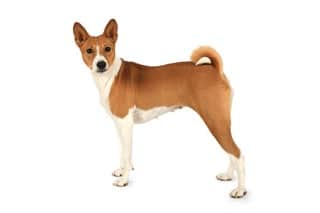
The Basenji is an ancient African breed of dog. First bred in Central Africa from at least the 1600s, they are known for their yodel-like vocalization. Basenjis are primarily known for their short, fine, silky coats and unique white markings. They have a wrinkled brow, large, pricked ears, dark eyes, and a curled tail. They have long legs, a muscular body, and are a medium sized breed. Common color variations include black, chestnut red, tricolour, and brindle.
It is believed that the Basenji was created by crossing the African Pariah Dog, the Congolese Dog, and the Greyhound. Uniquely, Basenjis do not bark, and their vocalizations are more like yodels. Additionally, they are known for their intelligence, athleticism, and independence. All of these traits make this breed a cherished companion and an excellent hunter.
Basenjis are known for their independent, intelligent, and loyal personalities. They are very creative and will solve puzzles to keep them entertained. They are quite gentle dogs and form strong bonds with their owners. They have an even-tempered, patient, and tolerant disposition and get along well with children and other pets, provided they are properly socialized early on.
Basenjis are an energetic breed that loves to run and have regular exercise needs, such as daily walks, runs, and playtime. Although they can adapt to living indoors, they are best suited to a home with access to a large outdoor area. They are generally quite quiet dogs with minimal barking, but enjoy plenty of mental stimulation to keep their active minds occupied.
In order to create a well-rounded and obedient dog, it is essential to provide proper training and socialization right from the start. Early socialization and obedience training can help Basenjis learn appropriate behaviors that will ensure a long and happy life together.
The Basenji is an active, alert, and curious breed that loves to explore. While they are highly independent pets, they still require regular physical activity and a balanced diet. To ensure the best life and keep the Basenji healthy, they require a diet rich in proteins, moderate fat, and the necessary vitamins and minerals. It’s important to consult with a veterinarian to receive specific recommendations as feeding requirements may vary between individual dogs.
Avoiding too many snacks between meals is key to regulate their intake and not adding too much weight. Responsible owners should provide their Basenji with a nutritional diet by considering the food’s quality, not quantity. To learn more about this breed, as well as to find out what foods they can and can’t eat, we invite you to try Way Canina. Our simple platform allows you to consolidate all the information you need for your pet’s health and nutritional requirements, making it easier and more convenient to provide your pup with the care and love they deserve. Thank you for considering your Basenji’s diet and needs!
The Basenji is a medium-sized breed of dog originally from Central Africa, extremely intelligent and energetic. When it comes to health, these dogs are generally healthy, but can be prone to certain health issues such as renal dysplasia, fanconi syndrome, and hip dysplasia.
To help prevent these issues, it is important to keep up with regular veterinary checkups, vaccinations, and preventive care. It is also important to keep up with their grooming needs, which should include a good brushing, bathing, and ear cleaning routine. To help keep them healthy, a balanced diet, with portion control, and regular exercise is also key to prevent obesity.
It is important to remember that this breed typically has a lifespan range of 10 to 12 years and there are certain factors that can influence their longevity, such as genetics, diet, exercise, and healthcare.
Are you a proud owner of a Basenji or thinking of becoming one? Before you make the plunge, it’s important to consider the responsibilities that come with being an owner and decide whether or not it’s the right fit. Understand the pros and cons of owning a Basenji and check out our blogs and articles on Way Canina to compare different breeds and get additional facts about dog lifestyle and wellbeing.